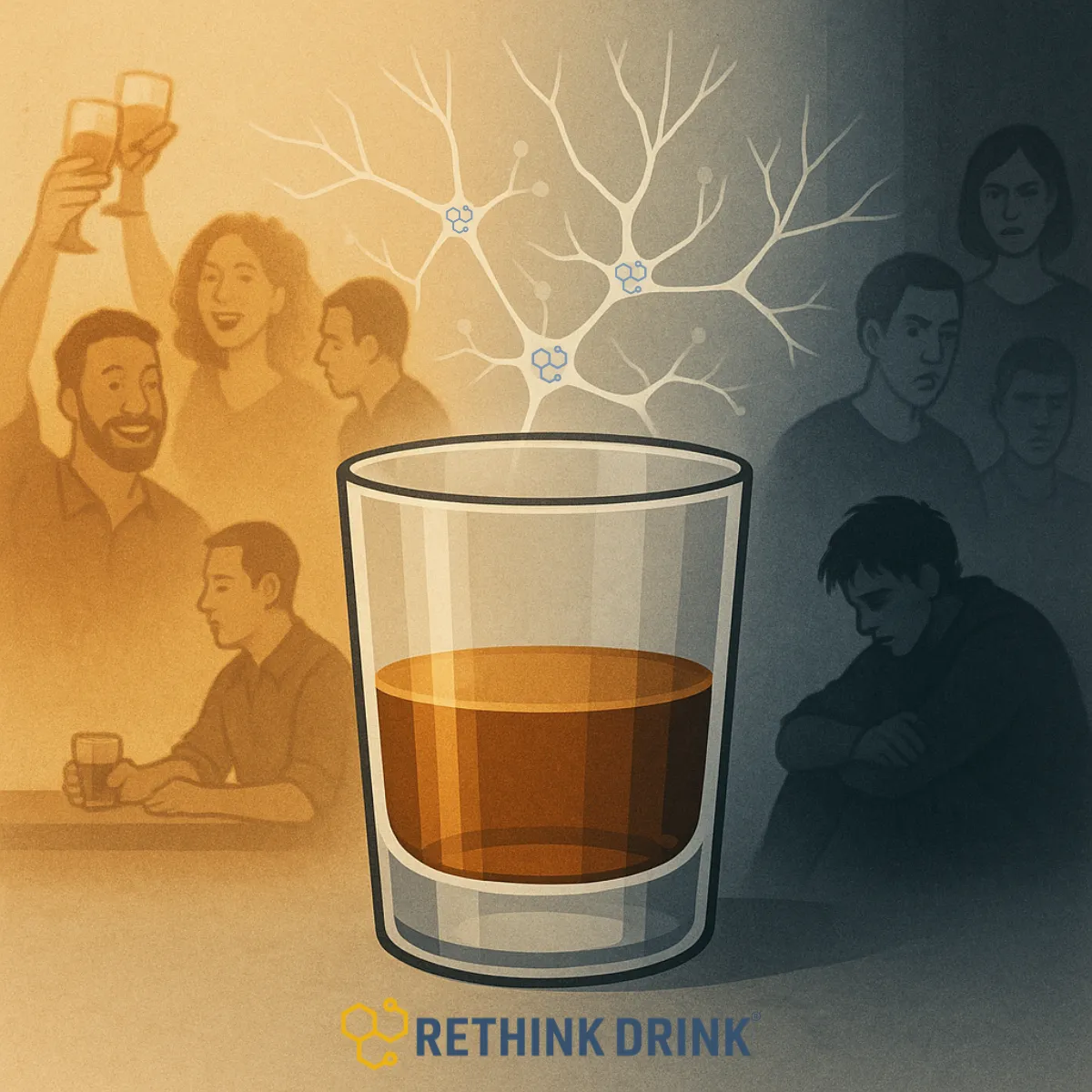
Alcohol and Society | Stigma, Science, and the Truth We Avoid
TL;DR:
Society celebrates drinking yet condemns those who struggle with it. Alcohol use disorder isn’t a moral failure... It’s a neurological condition that develops when alcohol hijacks the brain’s reward system. The outdated “once an alcoholic, always an alcoholic” belief fuels stigma and blocks early recovery. Rethink Drink offer a science-based approach in The Sinclair Method (TSM), that restores control and dignity, proving that change is possible at any stage.
Alcohol and Society | Stigma, Science, and the Truth We Avoid
Our society has a complicated relationship with alcohol. It’s celebrated, normalized, and woven into nearly every occasion: births, business meetings, romantic dates, parties. Yet when someone develops a problem with this same substance, the reaction changes completely. They’re judged, isolated, and stripped of empathy.
The mainstream ideas about alcoholism and its treatment reinforce this view: “tough love,” letting someone hit rock bottom, isolating them. I once heard someone say:if punishment cured addiction, there would be no addicts in the world. Living with addiction is punishment enough.
This raises important questions: Is it alcoholism or alcohol use disorder? Is it a disease or a personal weakness? Is it hereditary, or learned behaviour? These may sound like semantics, but they shape stigma, diagnosis, recovery, and even access to effective but lesser-known treatments.
What We Picture When We Hear “Alcoholism”
When you hear the word alcoholism, what image comes to mind?
Most people picture someone who has lost everything because of drinking, or maybe a homeless person living on society’s margins. Unless you are currently struggling yourself, you probably don’t identify with those images. Maybe you feel pity, or even disdain.
That’s the power of stigma. Social and media narratives tell us alcoholism looks a certain way. But the truth is, alcoholism is a chronic, progressive condition. Nobody wakes up one day trembling for their first morning drink. We all start the same way, having drinks in family or social settings.
And alcohol, like any drug, hijacks the brain’s reward system. All you need is a nervous system, drink often enough, reinforce the behaviour, dependency can develop.
Why Some Lose Control and Others Don’t
Why do some people spiral into addiction, while others seem to drink all their lives without trouble? Is it just about discipline?
The answer is more complex. Alcohol triggers the release of endorphins, giving us a sense of well-being. Our brain’s reward system is designed to reinforce behaviours important for survival: things like eating, exercise, affection, or sex. The more often a rewarding behaviour is repeated, the stronger the neural pathways become. The difference is that alcohol’s “reward” is far stronger than natural behaviours. It turns a simple neural pathway into a seven-lane highway, making the drive toward drinking faster and stronger, except, unlike exercise or affection, this is destructive.
We also know there’s a genetic component. People with alcoholism in the family may inherit a brain chemistry that makes them more vulnerable. Their brain responds more strongly to alcohol, instead of just feeling relaxed, they feel euphoric. This exaggerated reward reinforces drinking more quickly. Over time, tolerance builds, and other pleasures lose their impact.
Continuous drinking also alters systems involving dopamine, including decision-making, memory, and judgment. At that point, drinking is less about choice and more about compulsion.
So, is alcoholism hereditary or learned? The truth is: both. Someone may have a predisposition but never develop alcoholism if they never drink. But anyone who drinks enough times can build the habit. Even those without predisposition can become dependent, alcohol is powerful enough to hijack any nervous system. Other influences matter too, such as, drinking to cope with emotions, trauma, mental health struggles, or anxiety.
Why “Alcoholism” Isn’t the Whole Picture
This is where language matters.
When we say alcoholism, most people imagine someone at rock bottom: constant drinking, withdrawal symptoms, life in ruins.
But the term alcohol use disorder covers a much broader spectrum, including:
●People who notice early warning signs.
●Those who can’t stop once they start.
●People experiencing blackouts.
●Those whose personality changes when they drink.
●People who wake up anxious or depressed after drinking.
●Those drinking more frequently than before.
●People facing consequences in health, relationships, finances, or work.
These are clear signs of a problematic relationship with alcohol. Left untreated, dependency only deepens. That’s why it’s urgent to shift our perspective: this is not a moral failing, but neurological changes that alter motivation and behaviour.
And the earlier we intervene, the better the chances of recovery.
Time for a New Understanding
It’s time we understand that, as a society, we’ve got alcohol all wrong. “Once an alcoholic, always an alcoholic” is not a scientific truth. It’s an outdated belief that traps people in shame and hopelessness and prevents them from seeking help at early stages. Abstinence isn’t the only path to recovery. There is another way.
The Sinclair Method (TSM) offers a science-based solution that treats alcohol use disorder at its neurological root. When done correctly, it helps people regain control over drinking without the endless cycle of relapse and guilt. Unlike abstinence-based programs, it doesn’t demand rock bottom or a sense of failure: it restores choice, rather than constant battle. You are not powerless. Change and recovery are within your reach at any stage.
It’s time to replace stigma with science, fear with understanding, and hopelessness with a clear, science-based path forward. Recovery isn’t about rejecting who you are, it’s about freeing yourself from what no longer serves you and rediscovering your strength. With the right support and compassion, you can create lasting change, grounded in understanding, dignity, and choice.
Stefani Busatta
Rethink Drink are here to help you explore The Sinclair Method without judgement or pressure. If you’re ready to find out more, you can chat through things at a time that works for you by booking a call with one of the team.


